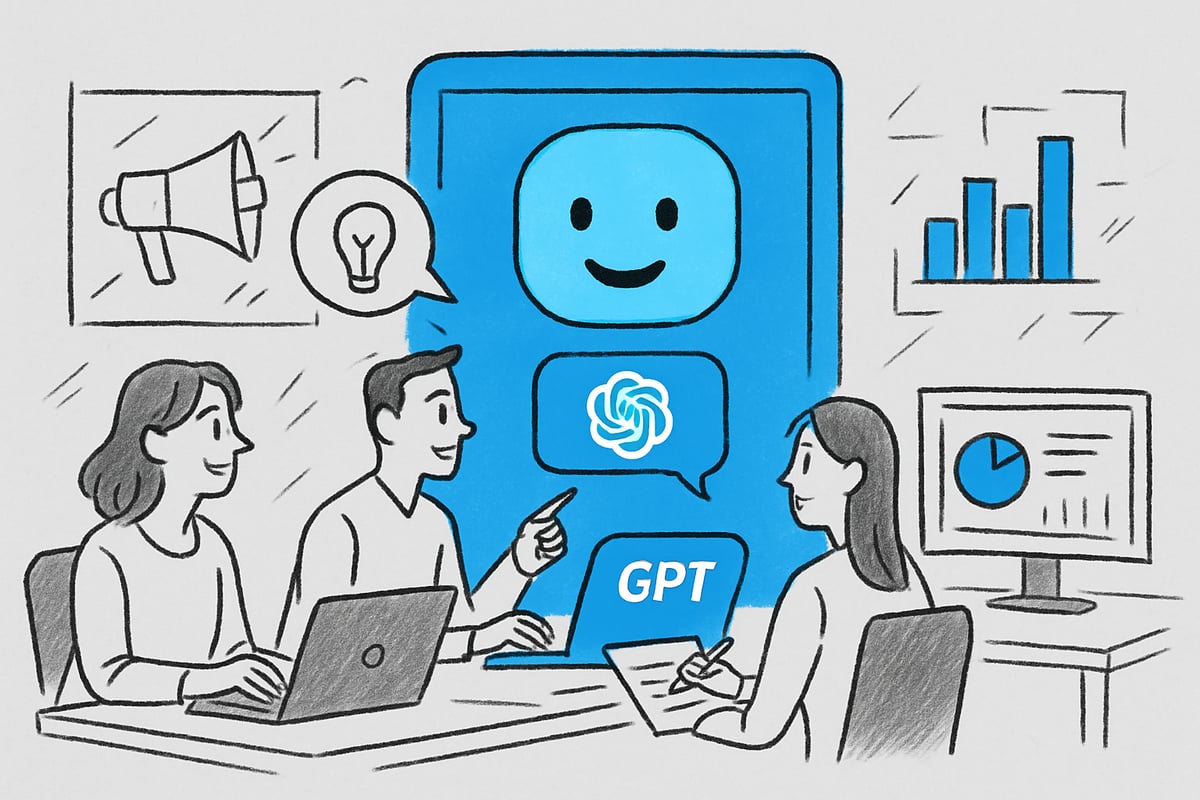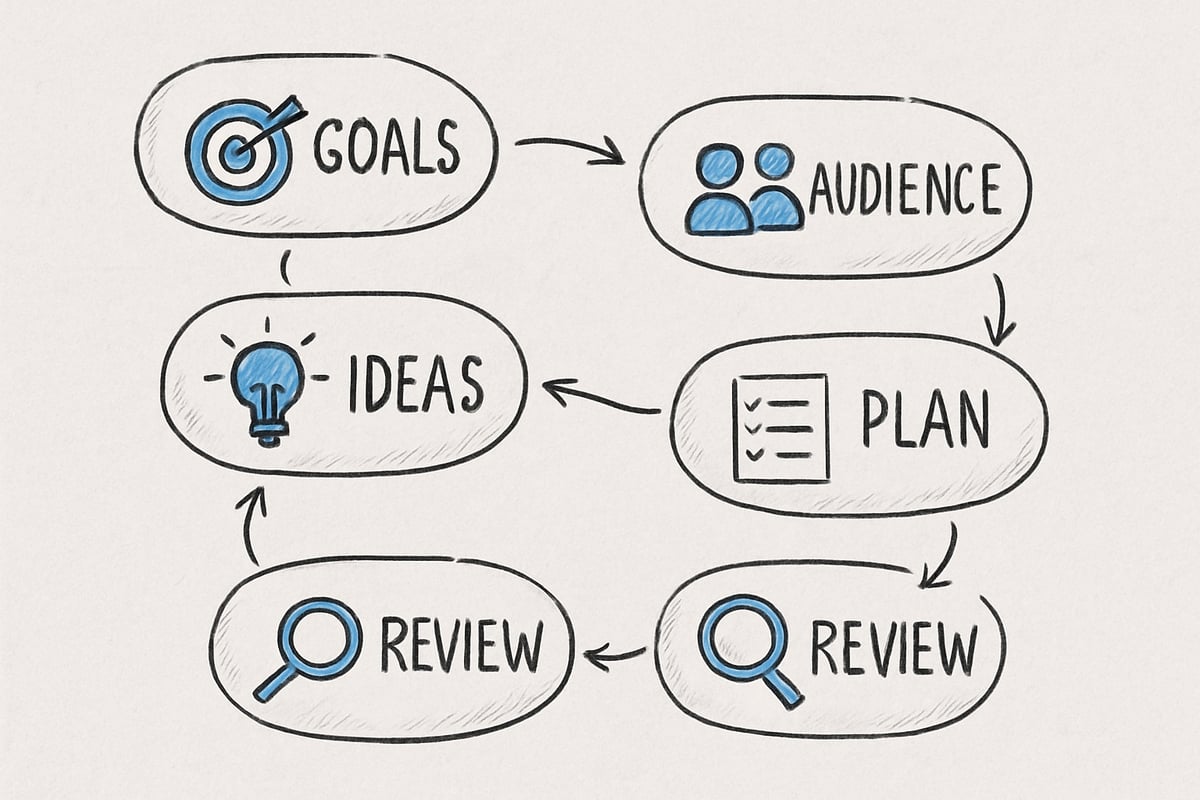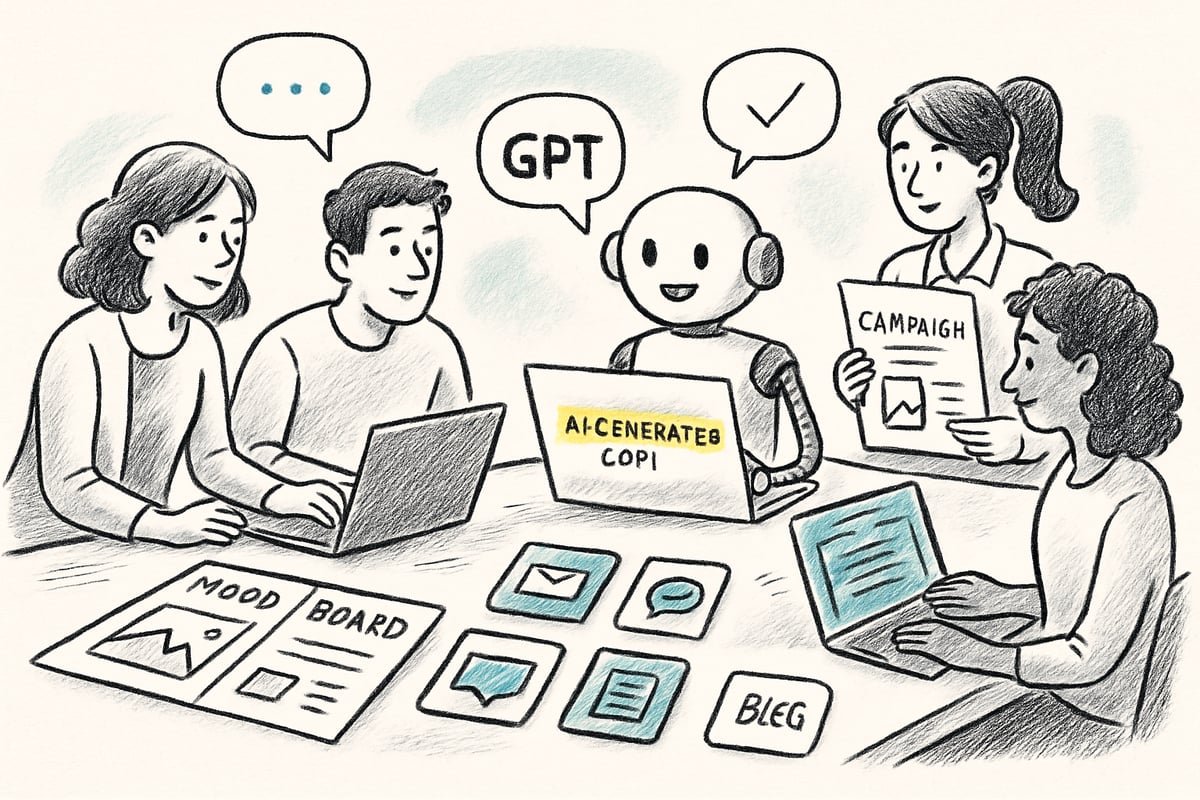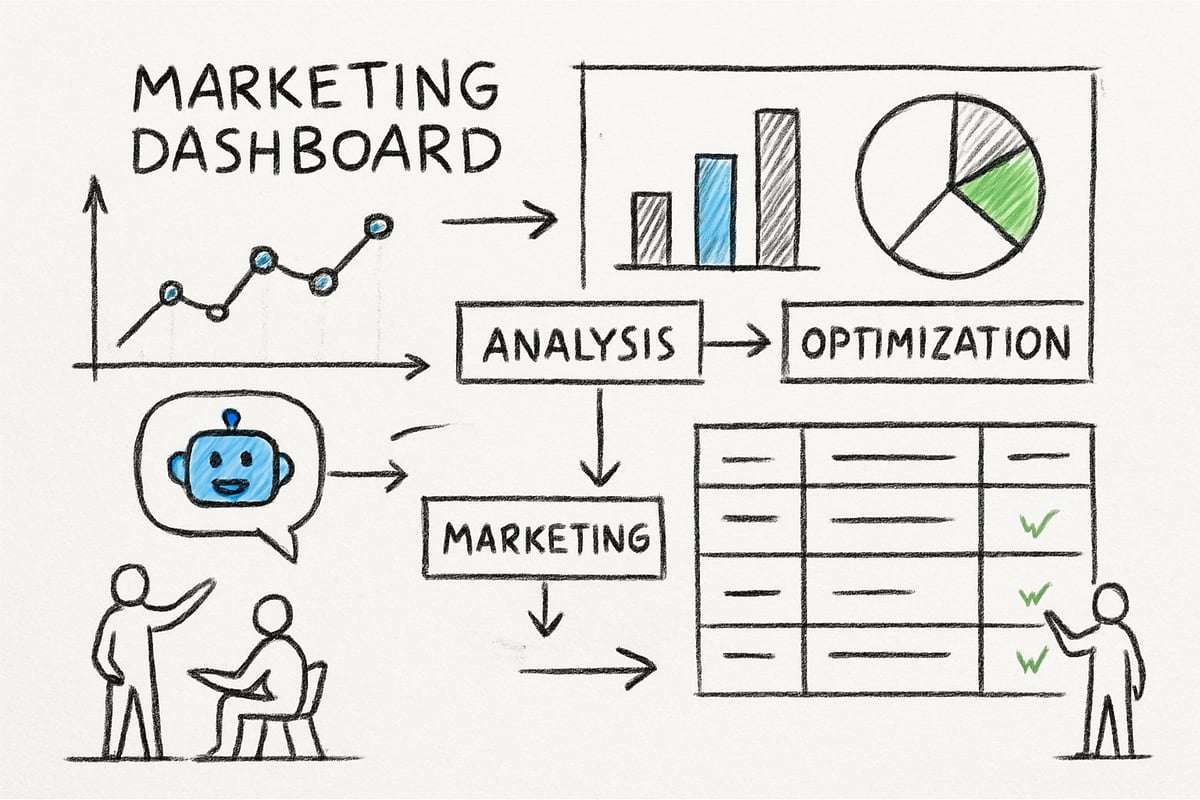Marketing is evolving at an unprecedented pace as AI technologies reshape the industry. The explosive rise of chatgpt for marketing has captured the attention of professionals worldwide, with more than 75% eager to adopt it, yet only 40% currently leveraging its power.
This guide is designed to help you strategically unlock measurable marketing success in 2025. You’ll discover actionable strategies, real-world applications, and proven best practices for weaving ChatGPT into your daily marketing workflows.
Explore how ChatGPT is transforming campaign planning, content creation, data analysis, and automation. Learn practical prompts, tools, and step-by-step workflows to keep your brand ahead in the AI-driven marketing landscape.
The Rise of ChatGPT in Marketing
The marketing landscape is evolving rapidly, with generative AI tools at the forefront of this transformation. ChatGPT for marketing is no longer a futuristic concept but a practical solution that marketers are adopting in record numbers. Industry surveys reveal that over three-quarters of marketers are eager to integrate ChatGPT into their workflows, yet only about 40% are currently leveraging its capabilities. This gap highlights a significant opportunity for early adopters.
Generative AI platforms like ChatGPT, Gemini, and Claude are now mainstream in marketing departments. ChatGPT for marketing is playing a key role in democratizing access to data-driven creativity and analytics. What started as a trend fueled by hype has become an everyday tool, helping marketers streamline tasks and deliver more impactful campaigns. According to Smart Insights’ “Future of Digital Marketing” report, generative AI is now widely used for copywriting and campaign ideation, proving its value across the industry.

ChatGPT Adoption and Industry Impact
Marketers across industries are embracing ChatGPT for marketing to enhance efficiency and creativity. According to a recent Smart Insights LinkedIn survey, more than 75% of marketers express a desire to use ChatGPT in their daily activities, while only 40% have fully integrated it so far. This surge in interest signals a shift from initial curiosity to widespread adoption.
Generative AI tools, including ChatGPT, have moved beyond experimental use. Marketers now rely on these platforms for tasks like brainstorming, content creation, and campaign planning. ChatGPT for marketing is credited with leveling the playing field, enabling teams of all sizes to access advanced analytics and creative support. The Smart Insights “Future of Digital Marketing” report confirms that generative AI is a staple for copywriting and campaign ideation, solidifying its place in the marketer’s toolkit.
Key Use Cases Transforming Marketing
The versatility of ChatGPT for marketing is evident in its broad range of applications. Marketers use it to generate content for websites, social media, emails, and ads. AI-powered chatbots and agents, built on ChatGPT, deliver enhanced customer service and support. Strategic planning is streamlined, with ChatGPT facilitating campaign brainstorming and messaging frameworks.
Data analysis and reporting have become more accessible, as ChatGPT automates complex tasks and generates actionable insights. Workflow automation is another area where AI excels, with integrations into tools like n8n and Zapier. For a deeper look at how businesses are using ChatGPT across these areas, explore these ChatGPT Use Cases in Marketing.
| Use Case | Example Application |
|---|---|
| Content Generation | Blog posts, ad copy, emails |
| Customer Service | AI chatbots, support agents |
| Strategic Planning | Campaign ideation, messaging |
| Data Analysis | Reporting, performance tracking |
| Workflow Automation | Scheduling, integrations |
Real-World Examples and Data
Organizations are already seeing measurable results from adopting ChatGPT for marketing. Smart Insights has developed a Digital Marketing Strategy Expert Agent powered by ChatGPT, guiding users through campaign planning and optimization. OpenAI Academy offers prompt packs that help marketers generate ideas and content more efficiently.
Businesses are leveraging ChatGPT for blog content, ad copy, and customer journey mapping. Industry infographics highlight nine major trends in AI-driven marketing, reinforcing the growing impact of ChatGPT for marketing in 2025.
Strategic Planning with ChatGPT: A Step-by-Step Guide
Strategic planning is the backbone of any successful marketing initiative. Leveraging chatgpt for marketing enables teams to move from scattered ideas to structured, data-driven campaigns. This step-by-step guide outlines how to incorporate AI into each phase of your planning workflow for 2025.

Step 1: Define Campaign Goals and Objectives
Starting with clear objectives is crucial. Chatgpt for marketing can help brainstorm and refine campaign goals by generating creative briefs and suggesting SMART objectives. For instance, prompt the AI with, “Create a creative brief for our next paid media campaign.” ChatGPT will propose measurable targets, timelines, and possible KPIs.
However, while AI can recommend goals, it is important to validate them against your business context. For more prompt ideas, refer to resources like ChatGPT Prompts for Marketers to inspire your planning.
Step 2: Audience Research and Persona Development
Understanding your audience shapes every marketing decision. Chatgpt for marketing can synthesize data from surveys, web analytics, or customer feedback to build detailed personas. You might ask, “Create a customer journey map for our
,” and receive a breakdown of audience pain points, interests, and behaviors.The AI serves as a collaborative assistant, helping to segment your audience and highlight opportunities for engagement. Always review generated personas for accuracy and relevance before applying them.
Step 3: Competitive and Market Analysis
A robust competitive analysis ensures your campaigns stand out. Chatgpt for marketing can aggregate competitor content strategies, analyze industry benchmarks, and even summarize recent trends. Use prompts such as, “Research how top 5 competitors structure their blog content strategy.”
While AI can process large volumes of public data, it may struggle with nuanced context or rapidly changing competitive landscapes. Supplement AI insights with your team’s market experience for a balanced perspective.
Step 4: Brainstorming Campaign Ideas and Messaging
Creativity fuels effective campaigns. Chatgpt for marketing excels at ideation, quickly generating campaign themes, taglines, and messaging frameworks. For example, prompt, “Brainstorm 5 creative campaign ideas for our upcoming [event/launch],” and receive a range of concepts, emotional triggers, and hooks.
This step benefits from collaborative iteration between AI and your team. Use the AI’s output as a springboard, then refine messaging to ensure it aligns with your brand identity and resonates with your audience.
Step 5: Structuring and Outlining Campaign Plans
Organized planning transforms ideas into action. Chatgpt for marketing can generate campaign timelines, assign task owners, and outline milestones. Try prompts like, “Build a timeline for our upcoming multi-channel campaign,” to receive a structured table or visual roadmap.
While AI quickly drafts initial plans, human oversight is essential for prioritizing tasks and adjusting to real-world changes. Review all AI-generated schedules and ensure they match your team’s capacity and strategic vision.
Step 6: Identifying Limitations and Best Practices
Despite its power, chatgpt for marketing has limits. AI may not grasp subtle business nuances or set practical targets. Risks include generic strategies and lack of creativity. Consider this checklist:
- May overlook company history or values
- Struggles to prioritize initiatives
- Lacks intuition for real-time pivots
- Cannot fully assess brand risks
- May miss cultural sensitivities
- Produces generic messaging
- Needs up-to-date data to remain relevant
- Relies on quality of prompts
- Cannot replace human judgment
- Requires ongoing review for accuracy
Best practice is to merge AI-generated plans with human expertise for optimal results.
Content Creation and Creative Development with ChatGPT
Chatgpt for marketing has rapidly become an essential tool for content creation, empowering teams to deliver impactful campaigns across every channel. Its ability to generate copy, assist with brand storytelling, and streamline collaboration means marketers can move from concept to execution faster than ever. For a deeper dive into how AI is reshaping marketing strategies, explore AI for Marketing Strategies.

Generating High-Impact Marketing Copy
Chatgpt for marketing allows marketers to quickly draft compelling emails, ad copy, blog articles, and social media posts. For example, you can prompt it with:
Write a launch email for our new product, targeting tech-savvy professionals.
It returns multiple copy variations, helping you test different hooks, tones, and calls to action. According to Smart Insights, over 75 percent of businesses now use chatgpt for marketing copywriting tasks.
- Rapid idea generation for all channels
- Consistent brand messaging
- Enhanced productivity for content teams
By leveraging chatgpt for marketing, teams can maintain a steady flow of creative, tested copy.
Visual and Brand Communication
Chatgpt for marketing supports visual storytelling and brand communication by generating scripts, moodboards, and style guides. For instance, prompt it to:
Draft a script for a 60-second explainer video about our eco-friendly product.
It can also outline brand guidelines, suggesting typography, color palettes, and tone of voice. Use it for brainstorming creative directions if planning a brand refresh.
- Scriptwriting for video and audio content
- Moodboard concepts for campaigns
- Brand style guide drafts
Chatgpt for marketing ensures your brand’s visual and narrative elements stay aligned and engaging.
Personalization and Audience Targeting
Effective personalization is a core advantage of chatgpt for marketing. The AI can customize copy for specific audience segments and buyer personas. Try this prompt:
Create a 3-post social media series for young entrepreneurs launching startups.
Chatgpt for marketing adapts tone and messaging based on your input data, ensuring each campaign resonates with its intended audience.
- Tailored messaging for different buyer personas
- Dynamic adaptation to campaign goals
- Authentic content aligned to brand voice
By refining outputs, marketers keep content personal and relevant at scale.
Collaboration and Workflow Integration
Integrating chatgpt for marketing into content calendars and approval workflows streamlines the creative process. Teams can use real-time editing and feedback tools, such as OpenAI’s canvas mode, for live copy iteration.
- Seamless collaboration between writers, designers, and strategists
- Efficient version control and approvals
- Centralized content management
Chatgpt for marketing acts as a collaborative partner, reducing bottlenecks and enhancing workflow efficiency.
Quality Control and Human Review
While chatgpt for marketing excels at content generation, human oversight is essential. AI-generated drafts should be reviewed for brand trust, factual accuracy, and cultural sensitivity. Best practices include:
| Quality Control Step | Description |
|---|---|
| Human Review | Ensure accuracy and appropriateness |
| Fact-Checking | Validate all data, statistics, and claims |
| Tone Alignment | Confirm brand voice and messaging consistency |
Smart Insights’ templates help tailor chatgpt for marketing output to unique business goals. Always view AI content as a starting point, not the final product.
Data Analysis, Reporting, and Optimization with ChatGPT
Modern marketing teams are turning to chatgpt for marketing to unlock actionable insights from data. With the ability to process and interpret large datasets, ChatGPT is reshaping how marketers approach performance analysis, reporting, and ongoing optimization.

Analyzing Marketing Performance Data
Chatgpt for marketing enables teams to upload spreadsheets and quickly analyze key metrics such as ROI, channel performance, and campaign effectiveness. Marketers can ask ChatGPT to identify top-performing channels or summarize conversion trends, receiving clear, data-driven answers.
For example, simply prompt: "Analyze this marketing performance spreadsheet and identify which channels drove the most leads last quarter." ChatGPT will generate tables and charts to visualize results, making complex data accessible for fast decision-making.
Key benefits:
- Rapid identification of winning channels
- Visual summaries for stakeholders
- Reduced manual analysis time
Customer Insights and Churn Analysis
Understanding why customers leave is crucial, and chatgpt for marketing can help process churn datasets to uncover patterns. By reviewing data such as tenure, product usage, and support tickets, ChatGPT can group customers by risk factors and provide actionable retention recommendations.
A typical prompt might be: "Review this churn dataset and highlight common reasons for customer loss." The AI returns clusters of at-risk customers and suggests targeted strategies, enabling marketing teams to proactively address churn and improve retention rates.
Survey and Feedback Summarization
After a campaign, marketers often face an avalanche of survey responses. Chatgpt for marketing can distill this feedback into concise summaries. By uploading survey data and prompting the AI, teams receive highlights of satisfaction drivers and areas needing improvement.
Prompt example: "Summarize insights from this post-campaign survey." ChatGPT will output bullet points, sentiment analysis, and even visual summaries for presentations. This streamlines stakeholder reporting and ensures the voice of the customer is central to optimization.
Forecasting and Predictive Analysis
Forecasting future results is a vital part of chatgpt for marketing workflows. ChatGPT can analyze historical data to predict leads, sales, or campaign outcomes. It identifies trends, seasonal shifts, and projects future performance in visually engaging charts and bullet-point insights.
For marketing teams looking to expand their AI toolkit, AI Tools for Marketing Teams offers a comprehensive overview of solutions that complement ChatGPT’s predictive analytics, helping teams stay ahead of the curve with informed planning.
Budget Optimization and Resource Allocation
Optimizing budgets is easier with chatgpt for marketing. Marketers can upload spend and performance data, then prompt the AI: "Recommend a revised budget allocation for next quarter." ChatGPT outputs tables with suggested percentage allocations for each channel, ensuring resources align with business goals.
This data-driven approach supports smarter investments, improves ROI, and frees up time for strategic thinking. Marketers still review and adjust recommendations, combining AI efficiency with human judgment to maximize results.
Automating Marketing Workflows with ChatGPT and AI Tools
Automation is transforming how marketing teams operate, streamlining processes and improving productivity at scale. By integrating chatgpt for marketing workflows, organizations unlock new efficiencies and gain a competitive edge.
Workflow Automation Tools and Integrations
Modern marketers are leveraging no-code and low-code platforms to automate repetitive tasks and connect chatgpt for marketing to their favorite tools. Solutions such as n8n and Zapier make it easy to link ChatGPT with email platforms, CRMs, and analytics dashboards using simple drag-and-drop interfaces.
Teams can schedule content, trigger campaign reports, and even automate follow-ups with minimal manual intervention. For those seeking deeper insights on how AI can streamline processes, Marketing Automation with AI provides a comprehensive overview of these benefits.
By integrating APIs, marketers ensure their chatgpt for marketing workflows remain flexible and scalable, adapting quickly to changing business needs.
Customer Service and AI Agents
The rise of chatgpt for marketing extends to customer support through AI-powered agents. These virtual assistants handle queries, recommend products, and provide instant responses across channels, freeing human teams for more complex issues.
For instance, leading platforms now deploy AI agents that can answer FAQs, resolve common issues, and escalate cases when necessary. Recent innovations, such as Adobe's AI Agents for Marketing, showcase how brands enhance consumer interactions with intelligent chatbots.
While these solutions provide 24 7 coverage and improve response times, it is vital to maintain brand consistency and clear escalation protocols within chatgpt for marketing implementations.
Campaign Execution and Monitoring
With chatgpt for marketing, campaign execution becomes more efficient and transparent. Marketers can automate the launch of email sequences, schedule social media posts, and set up alerts for campaign milestones or anomalies.
AI-driven monitoring tools track performance in real time, flagging issues for immediate action. Automated reporting ensures stakeholders receive accurate updates without manual effort.
However, human oversight remains essential. Teams must regularly review automated workflows to prevent errors and ensure the highest quality standards in chatgpt for marketing operations.
Governance, Trust, and Compliance
As automation scales, governance is critical for sustaining trust and compliance in chatgpt for marketing. Organizations should establish clear policies covering data privacy, transparency, and ethical AI use.
Documenting workflows, maintaining audit trails, and adopting templates like those from Smart Insights help ensure accountability. Regular reviews of automated processes safeguard brand reputation and support regulatory compliance.
By prioritizing governance, marketers can confidently scale chatgpt for marketing while upholding standards and customer trust.
Future Trends: ChatGPT and the Evolution of Marketing in 2025
As we look ahead, the landscape of chatgpt for marketing is set to transform rapidly. AI advancements and shifting industry expectations will shape how marketers leverage these tools for growth and innovation. Understanding the trends and preparing for what lies ahead ensures brands stay competitive and relevant.
Generative AI’s Expanding Role
Generative AI is moving beyond simple content creation and becoming a strategic asset in chatgpt for marketing. Marketers now use AI for audience segmentation, campaign optimization, and even real-time decision-making. With platforms like ChatGPT expected to reach 700 million weekly users in 2025, according to ChatGPT's User Growth in 2025, the influence of AI in marketing will only grow.
Multimodal AI, combining text, image, and audio, is opening new creative opportunities. Marketers can expect more sophisticated tools for personalization, predictive analytics, and campaign automation. As chatgpt for marketing evolves, organizations that embrace these capabilities will gain a significant competitive edge.
Human-AI Collaboration Models
The future of chatgpt for marketing centers on collaboration, not replacement. Marketers are increasingly working alongside AI to ideate, plan, and execute campaigns. Rather than fully automating creativity, AI augments human expertise, enabling faster brainstorming and deeper insights.
A recent industry report reinforces this trend, noting that while AI adoption is high, creativity and strategic oversight remain essential. AI's Impact on UK Marketing highlights how successful teams blend AI efficiency with human ingenuity. To maximize value, organizations should develop clear collaboration models, ensuring AI supports rather than overrides creative processes.
Challenges and Ethical Considerations
While chatgpt for marketing offers many advantages, it also introduces new challenges. Over-reliance on AI can lead to generic strategies, lack of brand differentiation, and even cultural missteps. Data privacy, copyright, and algorithmic bias are growing concerns for marketers using AI-generated content.
Ethical marketing requires ongoing vigilance. Teams must implement robust governance policies, regular audits, and transparent workflows. Upskilling staff and following established guidelines help address potential pitfalls. As AI becomes more central to marketing, maintaining trust and accountability is non-negotiable.
Preparing for the Next Wave of AI Innovation
To fully realize the benefits of chatgpt for marketing, organizations must foster a culture of continuous learning. Investing in AI literacy, prompt engineering skills, and agile workflows helps teams adapt to rapid changes. Monitoring industry case studies and trend reports keeps marketers ahead of the curve.
Building an AI-ready marketing team means encouraging experimentation while maintaining strategic discipline. By staying proactive and open to innovation, businesses can harness the full power of chatgpt for marketing and drive measurable results in 2025 and beyond.
